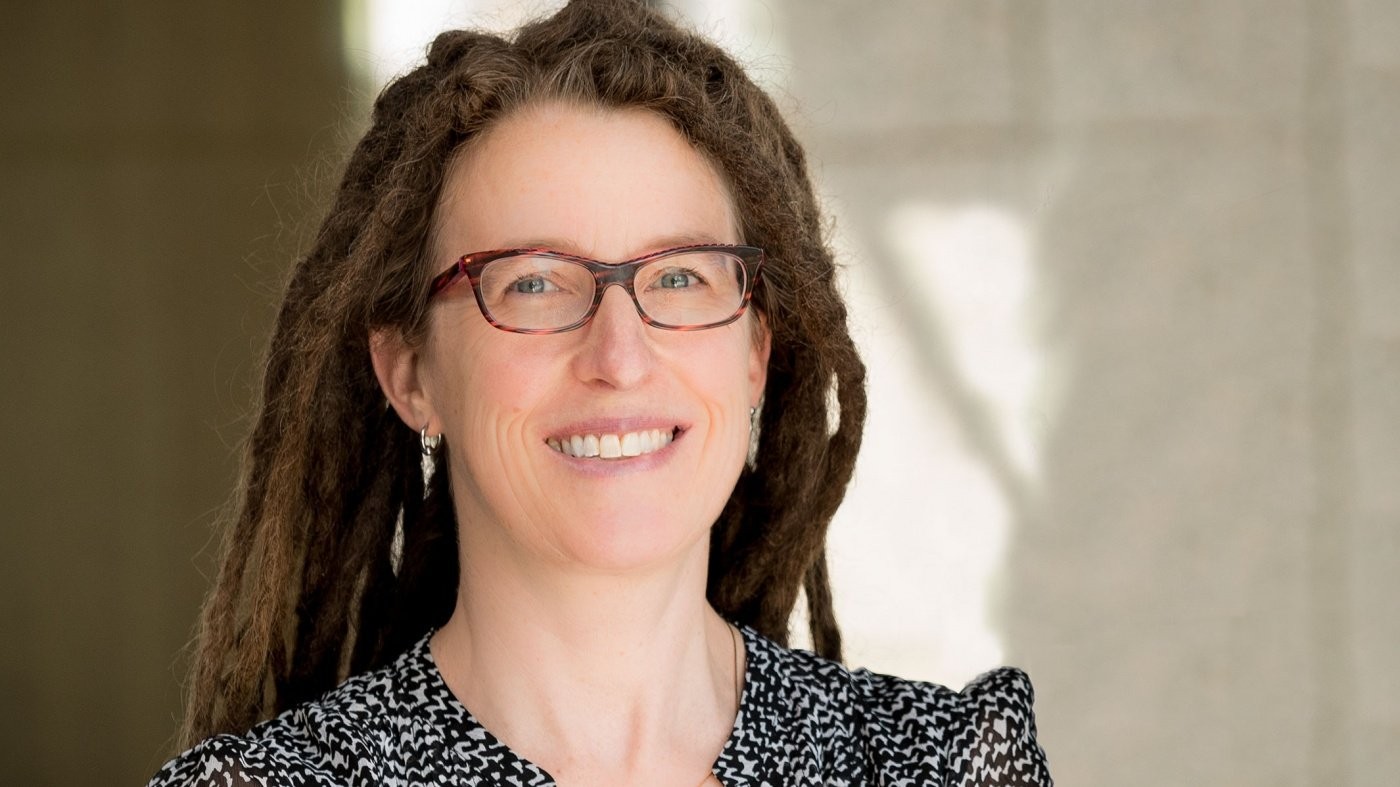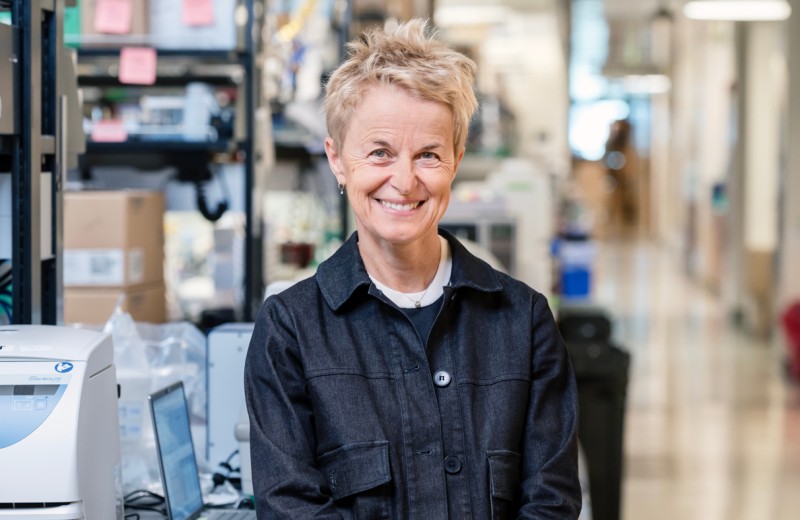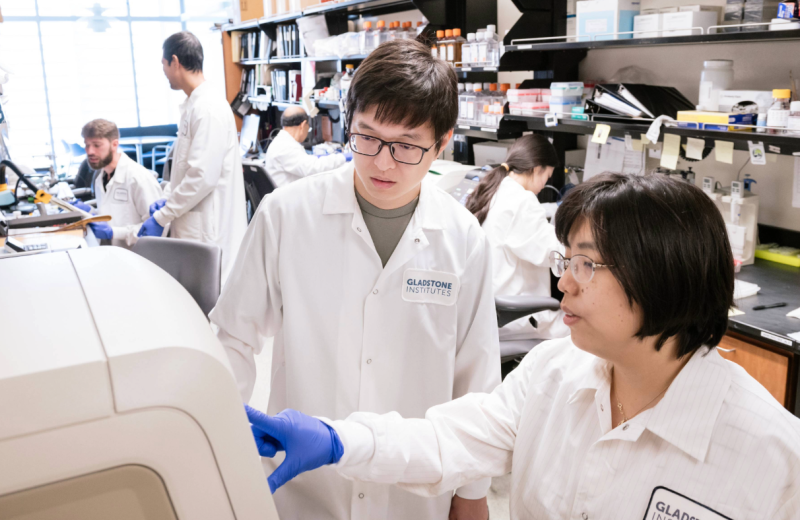Gladstone NOW: The Campaign Join Us on the Journey✕

Katie Pollard becomes director of the Biological and Medical Informatics Graduate Program at UC San Francisco.
In search of treatments for human diseases, medical researchers rely on the latest technologies to gather vast amounts of information. Genomics studies, for example, collect data about millions of DNA sequences, generating huge datasets. To decipher that much data, biomedical researchers rely on bioinformatics.
Bioinformatics applies quantitative data science techniques specifically to medical and biological information, and it is critical to the success of modern disease research.
Katie Pollard, PhD, senior investigator and director of the Gladstone Institute of Data Science and Biotechnology, is an expert and leader in bioinformatics. A statistician by training, she has devoted her career to applying mathematics and computer science to the study of human diseases.
Now, with her recent appointment as director of the Biological and Medical Informatics Graduate Program at UC San Francisco (UCSF), Pollard will have her hand in training the next generation of bioinformatics experts.
“Bioinformatics shouldn’t be an afterthought,” Pollard said. “Having a bioinformatics expert help optimize the data collection process from the beginning is key. We need both experts in experimental sciences and experts in computational sciences working together in order to do the research that we need to do today.”
Pollard is the third Gladstone investigator taking on leadership of a UC graduate program, following Anatol Kreitzer, Phd, (neuroscience) and Todd McDevitt, PhD, (bioengineering).
“Gladstone researchers are making a significant impact as leaders and educators at UCSF,” said Gladstone Institutes President Deepak Srivastava. “We are proud that Katie, Anatol, and Todd have been selected for, and have agreed to these roles; it shows that their expertise is acknowledged broadly and it strengthens Gladstone’s ties with UCSF graduate programs.”
Students in the Biological and Medical Informatics program learn to apply their expertise in computer science, statistics, and mathematics to manage and interpret a wide variety of biological data, from protein chemistry and genomics to imaging, clinical, and medical records data. Students may also choose to add an emphasis in Complex Biological Systems to study the emergent properties of complex living systems, such as cells, embryos, and tissues.
“Bioinformatics shouldn’t be an afterthought. Having a bioinformatics expert help optimize the data collection process from the beginning is key.”
As program director, Pollard will oversee student selection and training, and serve as a key link between students, faculty, and the Graduate Division Dean’s Office at UCSF. She will also be responsible for writing grants, and managing the program’s budget.
“I’m thrilled that Katie Pollard has agreed to take on this leadership role,” said Elizabeth Watkins, PhD, the dean of the UCSF Graduate Division. “She’s a renowned expert in bioinformatics who has trained many students and postdocs. Her numerous affiliations within the computational biology community will enable her to build on the already strong reputation of our bioinformatics program.”
Pollard’s short-term goals for the program include ensuring a smooth admissions process, and bringing new, young faculty on board to energize the program.
“I’m promoting a team approach to running the program,” said Pollard. “I think it makes the program more responsive if the group shares not only responsibilities, but also control over the destiny of the program.”
Over the next few years, Pollard also plans to strengthen the program’s existing connections with UC Berkeley.
“It makes a lot of sense for us to be more collaborative because our programs are quite complementary,” said Pollard, who has close working relationships with colleagues at UC Berkeley. “I’m really excited about that.”
Currently, UCSF students can take courses in math, statistics, and computer science at UC Berkeley. UC Berkeley students can, in turn, benefit from the research opportunities available at UCSF, particularly to apply informatics tools to biomedical research and to clinical data at the medical school. But right now, few students take advantage of those opportunities. Pollard aims to collaborate with her contacts as UC Berkeley to make it easier for students to take crossover courses, and to encourage more students to participate.
One of the most important roles Pollard will play as director, she said, is that of a one-on-one mentor to students when difficulties arise during their PhD training.
“The director sets the tone for the program, creating a culture of support for PhD students and ensuring that faculty members are committed to excellence in mentoring,” said Watkins, who is also vice chancellor of student academic affairs at UCSF. “Katie will serve as a strong role model in bioinformatics, especially for female students and faculty.”
Pollard, who is also a professor of epidemiology and biostatistics at UCSF, will continue in her role as director of the Gladstone Institute of Data Science and Biotechnology, which was founded in 2018.
Her lab at Gladstone develops rigorous statistical and computational models to study the organization of human and non-human genomes, and the activity of their genes. Her expertise has led her to collaborate with numerous biomedical researchers at Gladstone and elsewhere.
She has also facilitated the integration of bioinformatics and biomedical research at Gladstone by founding the Gladstone Bioinformatics Core when she joined the Institutes in 2008.
“Katie is an exemplary scientist and a visionary leader,” said Srivastava. “This new leadership position will further empower her to bring bioinformatics to the heart of biomedical research.”
For Media
Julie Langelier
Associate Director, Communications
415.734.5000
Email
About Gladstone Institutes
Gladstone Institutes is an independent, nonprofit life science research organization that uses visionary science and technology to overcome disease. Established in 1979, it is located in the epicenter of biomedical and technological innovation, in the Mission Bay neighborhood of San Francisco. Gladstone has created a research model that disrupts how science is done, funds big ideas, and attracts the brightest minds.
Want to Join the Team?
Our people are our most important asset. We offer a wide array of career opportunities both in our administrative offices and in our labs.
Explore CareersOne Person’s Final Gift to Science Gets Us Closer to an HIV Cure
One Person’s Final Gift to Science Gets Us Closer to an HIV Cure
A new documentary follows Jim Dunn’s end-of-life decision to donate his tissues to HIV research.
Institutional News HIV/AIDS Infectious Disease Roan LabBeyond Viruses: Expanding the Fight Against Infectious Diseases
Beyond Viruses: Expanding the Fight Against Infectious Diseases
The newly renamed Gladstone Infectious Disease Institute broadens its mission to address global health threats ranging from antibiotic resistance to infections that cause chronic diseases.
Institutional News News Release Cancer COVID-19 Hepatitis C HIV/AIDS Zika Virus Infectious DiseaseFueling Discovery at the Frontiers of Neuroscience: The NOMIS-Gladstone Fellowship Program
Fueling Discovery at the Frontiers of Neuroscience: The NOMIS-Gladstone Fellowship Program
The NOMIS-Gladstone Fellowship Program empowers early-career scientists to push the boundaries of neuroscience and unlock the brain’s deepest mysteries.
Institutional News Neurological Disease Mucke Lab NOMIS



